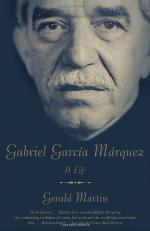|
This section contains 4,358 words (approx. 15 pages at 300 words per page) |

|
SOURCE: Landau, Iddo. “Metafiction as a Rhetorical Device in Hegel's History of Absolute Spirit and Gabriel García Márquez' One Hundred Years of Solitude.” CLIO 21, no. 4 (1992): 401-10.
In the following essay, Landau contrasts the use of metafiction as a rhetorical device in Hegel's history of “Absolute Spirit” and García Márquez's One Hundred Years of Solitude.
“Metafiction” has been defined as “fictional writing which self-consciously and systematically draws attention to its status as an artefact in order to pose questions about the relationship between fiction and reality.”1 Of course, many literary works include some element of self-awareness or self-reference. However, the term “metafiction” is usually applied only to those cases in which the self-relation is used to undermine our traditional understanding of the distinction between fiction and reality. Metafiction shows the rhetorical power to do so by relating a fictional work to itself, by including discussions...
|
This section contains 4,358 words (approx. 15 pages at 300 words per page) |

|


